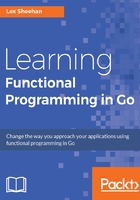
上QQ阅读APP看书,第一时间看更新
Who this book is for
A lot of the information in this book requires only a high school education.
For the programming sections in this book, you should have at least one year programming experience. Proficiency with Go or Haskell is ideal, but experience with other languages such as C/C++, Python, Javascript, Java, Scala or Ruby is also sufficient. You should have some familiarity using the command line.
This book should appeal to two groups:
- Non-programmers (read Chapter 11, Category Theory That Applies) If you are one of these:
- K-12 math teacher and want to see why what you are teaching matters
- Math teacher and want to see how what you are teaching relates to other branches of mathematics
- Student in law school and want to understand what you will be doing when you plead your client’s case
- Soccer enthusiast and like math
- Person interested in learning category theory
- Lover of the Lambda Calculus and want to see it illustrated with diagrams, pictures, and Go code
- Manager of software projects and want to see a better correspondence between requirement gathering, implementation, and testing
- C-level executive and want to understand what motivates and excites your IT staff
- Programmers: If you are one of these:
- Software enthusiast and want to learn Functional Programming
- Software tester and want to see a better correspondence between requirement gathering, implementation, and testing
- Software architect and want to understand how to use FP
- Go developer and like soccer
- Go developer and want to implement your business use case programming tasks with more expressive code
- Go developer and want to understand Generics
- Java developer and would like to understand why we say, less is more
- Your_language_here developer who knows FP and wants to transfer your skills to Go
- Go developer looking for a better way to build data transformation pipelines
- Go developer and would like to see a viable way to write less code, that is, fewer if err != nil blocks
- Experienced Go developer and want to learn FP or add some tools to your toolbox
- Person involved in software development and want to understand any of the terms below.
If you are a Go developer looking for working code, with line-by-line explanations for any of the following, this book is for you:
- Benchmark testing
- Concurrency (Goroutines/Channels)
- Currying
- Data transformation pipeline
- Decorator Pattern
- Dependency Injection
- Duck typing
- Embedding Interfaces
- Error handler
- Function composition
- Funcitonal parameters
- Functors
- Generics via code generation
- Hollywood Principle
- Interface-driven development
- I18N (language translation)
- IoC
- Lambda expressions in Go
- Layered application framework
- Log handler
- Monads
- Monoids
- Observer Pattern
- Partial application
- Pipeline to process credit card payments
- Recursion
- Reduce function to sum invoice totals
- Solve circular dependency errors
- Table-driven http API test framework
- Type Class
- Upload/download files to/from Google Cloud Buckets
- Y-Combinator
If I decide to change the format or update this info, I'll put it here: http://lexsheehan .blogspot.com/2017/11/who-this-book-is-for.html.